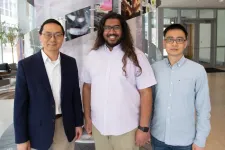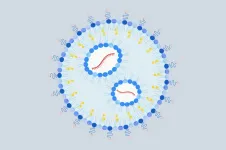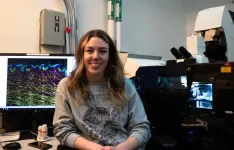Aging at AACR Annual Meeting 2023
2023-04-05
(Press-News.org)
Impact Journals (Aging's publisher) is proud to participate at the American Association for Cancer Research (AACR) Annual Meeting 2023, which convenes April 14-19 in Orlando, Florida.
BUFFALO, NY-April 4, 2023 – Impact Journals will be participating as an exhibitor at the American Association for Cancer Research (AACR) Annual Meeting 2023 from April 14-19 at the Orange County Convention Center in Orlando, Florida. This year, the AACR meeting theme is: “Advancing the Frontiers of Cancer Science and Medicine.”
Impact Journals publishes scholarly journals in the biomedical sciences with a focus on all areas of cancer and aging research. Aging is one of the most prominent journals published by Impact Journals. Aging’s 2021 Impact Factor is 5.955. This number has increased from 2020’s 5.682.
Visit booth #2642 at the AACR Annual Meeting 2023 to connect with members of the Aging team.
About Aging-US:
Launched in 2009, Aging (Aging-US) publishes papers of general interest and biological significance in all fields of aging research and age-related diseases, including cancer—and now, with a special focus on COVID-19 vulnerability as an age-dependent syndrome. Topics in Aging go beyond traditional gerontology, including, but not limited to, cellular and molecular biology, human age-related diseases, pathology in model organisms, signal transduction pathways (e.g., p53, sirtuins, and PI-3K/AKT/mTOR, among others), and approaches to modulating these signaling pathways.
Please visit our website at www.Aging-US.com and connect with us:
SoundCloud
Facebook
Twitter
Instagram
YouTube
LabTube
LinkedIn
Reddit
Pinterest
Click here to subscribe to Aging publication updates.
For media inquiries, please contact media@impactjournals.com.
Aging (Aging-US) Journal Office
6666 E. Quaker Str., Suite 1B
Orchard Park, NY 14127
Phone: 1-800-922-0957, option 1
###
END
[Attachments] See images for this press release:


ELSE PRESS RELEASES FROM THIS DATE:
2023-04-05
Many animals have evolved to tolerate extreme environments, including being able to survive crushing pressures of ocean trenches, unforgiving heat of deserts, and limited oxygen high in the mountains. These animals are often highly specialized to live in these specific environments, limiting them from moving to new locations. Yet, there are rare examples of species that once lived in harsh environments but have since colonized more temperate settings. Angel Rivera-Colón, a former graduate student now postdoc in the lab of Julian Catchen (CIS/GNDP), an associate professor in the department ...
2023-04-05
Similar to how cells within human tissues communicate and function together as a whole, bacteria are also able to communicate with each other through chemical signals, a behavior known as quorum signaling (QS). These chemical signals spread through a biofilm that colonies of bacteria form after they reach a certain density, and are used to help the colonies scavenge food, as well as defend against threats, like antibiotics.
“QS helps them to build infrastructure around them, like a city,” ...
2023-04-05
Living organisms produce a myriad of natural products which can be used in modern medicine and therapeutics. Bacteria and other microbes have become the main source for natural products, including a growing family called ribosomally synthesized and post-translationally modified peptides, or RiPPs. The labs of Douglas Mitchell (MMG), John and Margaret Witt Professor of Chemistry, and Huimin Zhao (CABBI/BSD/GSE/MMG), Steven L. Miller Chair of Chemical and Biomolecular Engineering, at the University of Illinois Urbana-Champaign have been working in tandem to identify and analyze new RiPPs that could be good candidates ...
2023-04-05
Peanut allergies affect 1 in 50 children, and the most severe cases lead to a potentially deadly immune reaction called anaphylactic shock.
Currently, there is only one approved treatment that reduces the severity of the allergic reaction, and it takes months to kick in. A group of UCLA immunologists is aiming to change that.
Taking inspiration from COVID-19 vaccines as well as their own research on the disease, they created a first-of-its-kind nanoparticle — so small it’s measured in billionths of a meter — that delivers mRNA to specific cells in the liver. Those cells, in turn, teach the body’s natural defenses to tolerate ...
2023-04-05
Haley Marks is a project scientist for the Advanced Light Microscopy Lab (ALMS) at the CNSI at UCLA. She is a biomedical engineer with a specialty in nano-biosensor research, translational medicine, and optics education.
Since joining CNSI in 2022, Haley has served as a technical expert, providing advanced light microscopy training and services to ALMS users. Here she works on developing and optimizing ALMS’s existing super-resolution and high-speed optical methods, developing strategies and imaging tools for in vivo imaging, and optimizing and disseminating computational imaging techniques.
Haley has a passion for all things photonics, and enjoys 3D printing, materials ...
2023-04-05
A new study published in the CABI journal Human-Animal Interactions reveals that young dog owners tend to cope well when their beloved pooch misbehaves.
Past studies suggest that around 90% of dogs display undesired behaviours such as aggression and disobedience, but little is known about the impact of this on young people’s experiences and accompanying emotions.
A team of scientists interviewed young dog owners in Canada, aged 17 to 26 years, to try and determine their experiences with their pets and their coping strategies in response to bad behaviour.
This included barking occasional and persistent barking and, in extreme cases, being aggressive towards other dogs ...
2023-04-05
Humans have a way of understandings others’ goals, desires and beliefs, a crucial skill that allows us to anticipate people’s actions. Taking bread out of the toaster? You’ll need a plate. Sweeping up leaves? I’ll grab the green trash can.
This skill, often referred to as “theory of mind,” comes easily to us as humans, but is still challenging for robots. But, if robots are to become truly collaborative helpers in manufacturing and in everyday life, they need to learn the same abilities.
In ...
2023-04-05
How can we make wearable devices like Spiderman’s suit that are thin and soft yet also feature various electrical and optical functionalities? The answer lies in producing novel materials that go far beyond the performance of existing materials and developing technology that enables the precise control of the physical properties of such materials.
Separating transition metal dichalcogenide (TMD) into a single layer just like graphene makes it transform into a thin, two-dimensional (2D) film material that exhibits the characteristics of highly performing semiconductors. By stacking two disparate ...
2023-04-05
Contrary to earlier research findings, people of power - think about politicians, celebrities or bullies in school - turn out to be no less concerned about their reputation, compared to those who have less influence and control within the society.
Previously, it has been assumed that since those who have the upper hand in the society - unlike the ‘powerless’ - are able to get away with commonly unacceptable behaviour (e.g. aggression and exploitation), would care less about any potential damages to their reputation.
However, a recent study by scientists at the University of Kent (United Kingdom) ...
2023-04-04
• Research at Aston University focuses on both creating lab-based meat and its psychological acceptance
• Dr Eirini Theodosiou and Dr Jason Thomas will be speaking at April’s Society matters LIVE event
• Lab made meat on the menu? will take place at Cafe Artum in Hockley Social Club on Thursday 27 April.
Lab made meat will be the topic of the latest Society matters LIVE event from Aston University at Café Artum at Birmingham’s Hockley ...
LAST 30 PRESS RELEASES:
[Press-News.org] Aging at AACR Annual Meeting 2023







